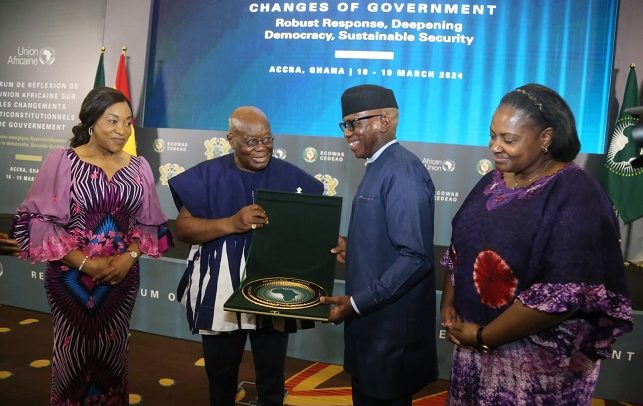President Akufo-Addo receiving a gift from Ambassador Bankole Adeoye (2nd R), with them are Shirley Ayorkor Botchwey (L), and Emilia Ndinelao Mkusa
President Akufo-Addo has expressed serious concern about the growing trend of coup d’etats in Africa, especially in the West African sub-region.
He thinks the time is ripe for all leaders on the continent to do whatever it takes to nib coup d’etats in the bud since it retards the growth and development of Africa.
Addressing an African Union (AU) Forum on ‘Unconstitutional Changes of Governments’ in Accra yesterday, he therefore charged leaders on the African continent to double efforts in finding lasting solutions to the rise in unconstitutional changes in government.
The President could not fathom that in spite of the many democratic templates agreed on at various other fora to advance democratic and constitutional rule, the continent was still bedeviled with a rising rate of coup d’états.
He recalled with nostalgia the 16th Extraordinary Summit of the Assembly of the African Union held in Malabo, which endorsed the Accra Declaration and made provisions to enhance the effectiveness of the continent’s collective response to the spread of coups on the continent.
“The Accra Declaration and the Malabo summit decisions affirmed our collective commitment to the principle of zero tolerance for coup d’états… I am happy that Africa’s position on this matter in letter and spirit is an unequivocal condemnation of any form of ascent to power that is outside constitutional provisions and inimical to democratic norms.
“That notwithstanding, the last two years have witnessed an increase in unconstitutional changes in government on the continent,” the President stated.
To measure the progress made or otherwise of progress made in safeguarding democratic governance on the continent, President Akufo-Addo made a comparison of the state of governance in Africa two years ago and the current dispensation, with a sorry conclusion that the situation has turned out for the worse.
“When we gathered here two years ago, four member states of our union had been suspended due to the occurrence of unconstitutional changes of governments in their territories. The situation was so dire that our meeting here in Accra was clearly necessary two years later, the situation has worsened. As we gather here, six member states of the union are suspended for the same reasons,” he added.
The downward trends, he said, requires a workable and result-oriented approach to execute, and the implementing interventions spelt out in previous fora to advance democracy on the continent.
“From all indications, there has been a deterioration, and we must answer why even in the best of instances, only incremental progress is being made,” he stated.
He noted particularly the aspects of governance deficit, and the manipulation of democratic practices such as tampering with electoral laws, constitutional provisions and term limits, with the goal of benefiting at the expense of democratic norms and principles as a major cause of dissatisfaction among citizens, which results in coups.
President Akufo-Addo, thus, charged the forum to reflect deeply and ask the tough questions that have often been overlooked in the quest for finding a lasting solution to the plethora of coups that have bedeviled the continent in recent times.
He however emphasised that, “when elections are not truly free and fair, and legal tactics are employed to undermine the spirit of democracy, when legal loopholes are exploited to subvert constitutional provisions that guarantee inclusion and participation, and when state apparatus is used to muzzle freedom of expression, citizens begin to feel that democratic processes have taken them hostage and often celebrate anything that looks like an end to their present predicament.”
The forum brought together African policy and decision-makers, including representatives of the Permanent Representatives Committee, and the armed forces of AU member states, as well as the AU Commission and relevant AU organs, and Regional Economic Communities/Regional Mechanisms (RECs/RMs).
These stakeholders will also exchange views on consolidating democratic governance, advancing national ownership of governance processes, and strengthening constitutionalism and the rule of law in Africa. They will align on coordination and coherence to effectively implement the Malabo and Accra Declarations.
On her part, the Chairperson of the African Union (AU) Peace and Security Council, Ambassador Emilia Ndinelao Mkusa, also had cause to express grave concern about the resurgence of military takeovers in Africa, and urged African leaders to intensify their efforts to addressing the root causes of the coup d’états.
The AU has always expressed abhorrence towards military takeovers and insisted on “zero tolerance” for violent resurgence, she stated.
She said Article 5 of the AU Charter promotes democratic principles, good governance, free, fair and transparent elections, and women and youth empowerment.
Ambassador Mkusa, thus, underscored the need for African leaders to strictly adhere to the tenets of democracy and respect the concerns of the citizens.
Ambassador Mkusa therefore made a clarion call on African leaders to sharpen the governance structures at the national level, to empower the citizens economically, and create employment opportunities for the youth.
She was of the belief that if manipulation of elections and unconstitutional extension of presidential term limit persists, Africa would continue to face democratic challenges.
She, thus, entreated the participants to be frank with issues concerning the root causes of military resurgence in Africa and take decisive actions to addressing them in earnest.
Africa has witnessed six military takeovers since the year 2022, with several abortive coups.
The AU has since suspended the military juntas of those countries from its activities, and imposed various sanctions on them.
The Accra Forum II underscores the AU’s commitment to upholding democratic principles and ensuring sustainable security in Africa.
By Charles Takyi-Boadu, Presidential Correspondent


